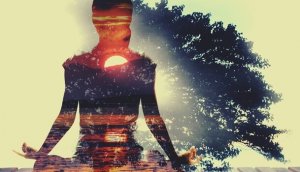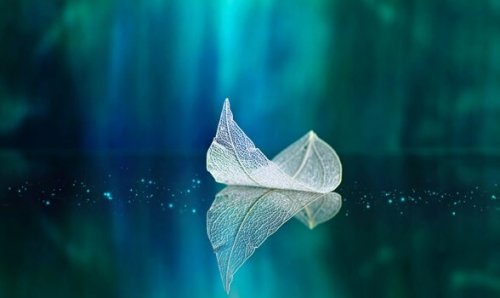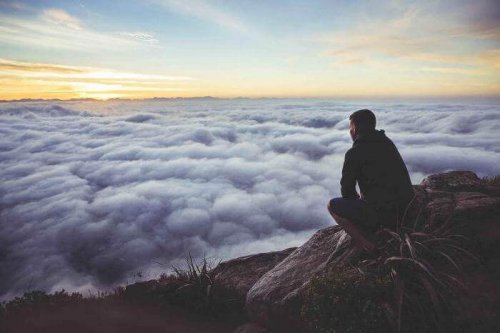Wu Wei: The Art of Non-Action

Wu wei is a Taoist concept that means “non-action”. It’s a philosophy which states that the best way to deal with a situation, especially with a conflict, is not to act at all. Moreover, not forcing any solution, but just letting things flow.
Most of us find a philosophy that teaches us non-action strange. We live in a society that constantly induces us to do the opposite. In fact, we’re living a life full of things to do, feelings, and thoughts. And when we’re doing nothing, we feel strange. We would think that this is simply a waste of time.
“From the emptiness of the wise emerges tranquility; from tranquility, action; from action, success.”
-Chuang Tzu-
Philosopher Lao Tzu wrote the Tao Te Ching 25 centuries ago. This philosopher reasoned that the best way to live was by harmonizing with the flow of nature and the cosmos. This is the main idea of the wu wei: to let things take their natural course and to adapt to it.
The values and virtues found in wu wei
Wu wei proposes a simple way of life because this translates into peace and harmony. This simplicity means not getting too attached to ambitions and desires since they’re the major sources of chaos and suffering, rather than understanding.

Simplicity also helps us live in a more peaceful way. This is impossible when we’re focused on achieving great things. It’s about valuing what we are and what we have instead of complaining about what we aren’t or don’t have.
In the same way, the wu wei argues that simplicity helps us accept things as they are, not resist the course of events, nor pretend to take control over them. These are values and attitudes that contradict the Western mentality, but which cultivate greater emotional balance.
The wu wei and excesses
Wu wei also directs our attention to the fact that excesses are the main source of problems. Contrary to what many think, it’s not the failures, but the excesses that make us feel more anxious. Therefore, the practical elements of the wu wei concentrate mainly on four points:
- Accept the fact that you create problems. Problems don’t arise from nothing. They’re created by our actions and by our mind.
- Don’t make a mental effort to solve problems. Don’t put them in your mind, nor create solutions for them. The idea is to let them solve themselves and not to take them seriously.
- Learn to appreciate the natural flow of things. This means adopting an attitude of non-action in the face of circumstances without thinking that you should intervene.
- Let the mind flow. Don’t try to give it a specific direction or focus. Simply allow it to follow its own course.

Wait and see
One of the principles of wu wei is to learn how to wait and see. It’s based on the idea that energy must be conserved for actions without any recourse. The people who wait for the right time will know how to act with great prudence. Also, with great energy, since they haven’t wasted it in insignificant actions.
Furthermore, he who knows how to wait and see may solve any situation with great ease. It hardly entails effort. This doesn’t mean negligence or passivity, but rather harmony with the natural flow of events. We must emphasize that nothing remains unchanged. It’s actually quite the opposite. What exists is constantly changing, with or without individual actions.
What we mean then is not to resist an event. Some of our actions make us resist. This generates a negative force that may become counterproductive. Instead of helping us preserve ourselves, it incites us to harm ourselves in that struggle. The goal is to allow everything to happen naturally, without resisting it.
Wu wei is a Taoist concept that means “non-action”. It’s a philosophy which states that the best way to deal with a situation, especially with a conflict, is not to act at all. Moreover, not forcing any solution, but just letting things flow.
Most of us find a philosophy that teaches us non-action strange. We live in a society that constantly induces us to do the opposite. In fact, we’re living a life full of things to do, feelings, and thoughts. And when we’re doing nothing, we feel strange. We would think that this is simply a waste of time.
“From the emptiness of the wise emerges tranquility; from tranquility, action; from action, success.”
-Chuang Tzu-
Philosopher Lao Tzu wrote the Tao Te Ching 25 centuries ago. This philosopher reasoned that the best way to live was by harmonizing with the flow of nature and the cosmos. This is the main idea of the wu wei: to let things take their natural course and to adapt to it.
The values and virtues found in wu wei
Wu wei proposes a simple way of life because this translates into peace and harmony. This simplicity means not getting too attached to ambitions and desires since they’re the major sources of chaos and suffering, rather than understanding.

Simplicity also helps us live in a more peaceful way. This is impossible when we’re focused on achieving great things. It’s about valuing what we are and what we have instead of complaining about what we aren’t or don’t have.
In the same way, the wu wei argues that simplicity helps us accept things as they are, not resist the course of events, nor pretend to take control over them. These are values and attitudes that contradict the Western mentality, but which cultivate greater emotional balance.
The wu wei and excesses
Wu wei also directs our attention to the fact that excesses are the main source of problems. Contrary to what many think, it’s not the failures, but the excesses that make us feel more anxious. Therefore, the practical elements of the wu wei concentrate mainly on four points:
- Accept the fact that you create problems. Problems don’t arise from nothing. They’re created by our actions and by our mind.
- Don’t make a mental effort to solve problems. Don’t put them in your mind, nor create solutions for them. The idea is to let them solve themselves and not to take them seriously.
- Learn to appreciate the natural flow of things. This means adopting an attitude of non-action in the face of circumstances without thinking that you should intervene.
- Let the mind flow. Don’t try to give it a specific direction or focus. Simply allow it to follow its own course.

Wait and see
One of the principles of wu wei is to learn how to wait and see. It’s based on the idea that energy must be conserved for actions without any recourse. The people who wait for the right time will know how to act with great prudence. Also, with great energy, since they haven’t wasted it in insignificant actions.
Furthermore, he who knows how to wait and see may solve any situation with great ease. It hardly entails effort. This doesn’t mean negligence or passivity, but rather harmony with the natural flow of events. We must emphasize that nothing remains unchanged. It’s actually quite the opposite. What exists is constantly changing, with or without individual actions.
What we mean then is not to resist an event. Some of our actions make us resist. This generates a negative force that may become counterproductive. Instead of helping us preserve ourselves, it incites us to harm ourselves in that struggle. The goal is to allow everything to happen naturally, without resisting it.
This text is provided for informational purposes only and does not replace consultation with a professional. If in doubt, consult your specialist.







